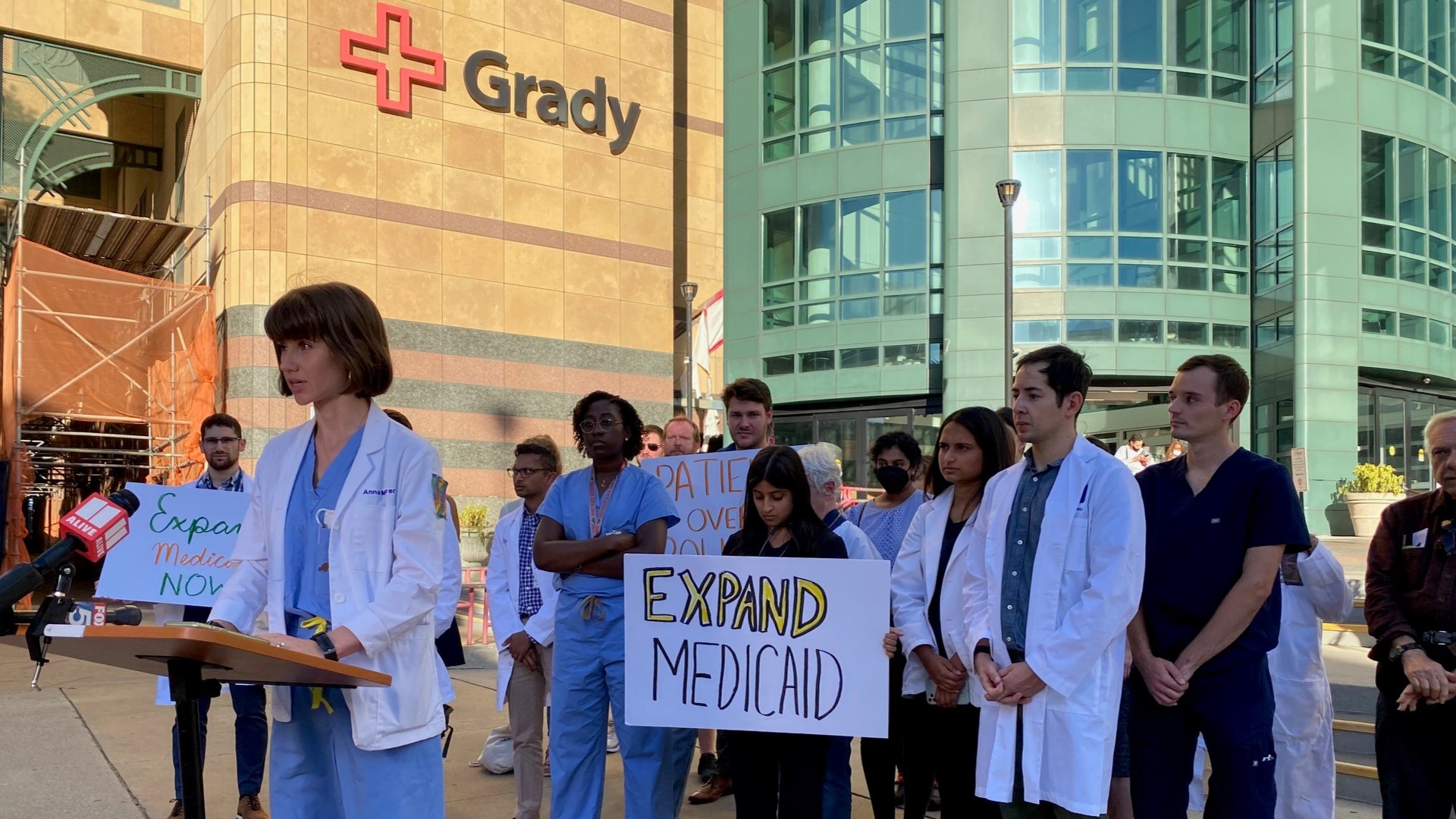ATLANTA — Doctors, nurses, residents, and medical students stood outside Grady Hospital on Tuesday evening, making a desperate plea to Gov. Brian Kemp to expand Medicaid.
This comes before the impending closure of Atlanta Medical Center, which would see level one trauma patients rerouted to Grady Hospital.
The group of medical professionals said Medicaid expansion would help them take care of the sickest and poorest patients.
“We are overflowing an already drowning system," said Dr. Janice Bonsu, an orthopedic surgery resident
For 40 minutes, 20 health professionals detailed the difficult decisions hospital like Grady must make, such as diverting patients and lack of space.
“You walk down the hallways in the emergency rooms, there are patients sleeping cots because we don’t have enough room, bleeding. We’re providing procedures in the hallways because we don’t have space," Dr. Bonsu said.
Internal Medicine resident Dr. Mark Spencer added, “We have to tell our ambulances ‘please go somewhere else.’ There’s nowhere else to go.”
20-year nurse, Rita Valenti said she often sees patients return to the ER again and again, simply because they cannot afford the outpatient care for things like prescriptions.
“I see this patient and he was hospitalized and given prescriptions to take. A little while later, I see him and I said, 'Well, how are you doing?' He has a stack of papers this high and said, 'Well, I haven't been able to take my medications.' He didn’t have Medicaid. He could not afford his medications. I know he's going to be back in the emergency room if he isn't already," Valenti said.
Going to the ER because of a lack of insurance and a lack of seeing a primary care physician can sometimes result in minor health issues becoming a major problem. In addition, professionals said they often have to "bend the rules" and admit patients to the hospital when they otherwise discharge the patient for outpatient services.
Dr. Bonsu pointed to one example, “There was a homeless man who was run over at night, came to us and had a complex leg operation, and he needed special wound care equipment but of course, he couldn’t afford it. So, we decided to follow him close in clinic but 'How do you call a homeless man when he doesn’t have access to a phone?' So, we were left to admit him to the hospital, where he stayed for three months waiting for his wound to heal enough so that he could safely be released back to the streets.”
What’s the fix? These medical professionals said expanding Medicaid is the first step.
“Where we can skip all the hospital bailouts, we can skip hospital closures, and we can get people the help they need in a structured manner," Dr. Abhi Kole said.
Wellstar’s said Medicaid expansion would have helped, but overall wouldn’t have changed the final outcome to close AMC. But, research does point to hospitals feeling the lift of a financial burden thanks to Medicaid expansion.
Gov. Kemp already announced a plan to provide $130 million to Grady to help offset costs and build 200 more beds. But Valenti and others said that's only a short-term solution.
“I’ve been doing this for a very long time. This is not the first time that doctors, medical students, nursing students have stood in front of Grady and demanded that our patients receive the care that they need and they need to have Medicaid insurance in order to do that,” Valenti said.
Grady's CEO previously said the hospital will manage to take on a good deal of the burden once AMC closes. However, the medical professional, not speaking in any official capacity for Grady Hospital, said wait times often exceed 10 hours in the ER and they worry with AMC closing, patients will sit in the hospital where their illness might worsen before anyone can see them.
Dr. Spencer worries without Medicaid expansion and AMC's closure will only exacerbate health inequities for low-income Georgians and people of color.
"Medicaid expansion would immediately allow 500,000 to 600,000 uninsured Georgians to access affordable health insurance," Dr. Spencer said. "Roughly 25% of Grady Memorial Hospital's patients are uninsured, severely straining the hospital financially and limiting what resources can be offered."
"Put down your political agendas," Dr. Bonsu added. "So that we can do the only thing we know how to do and that’s care for the people of this city.”

